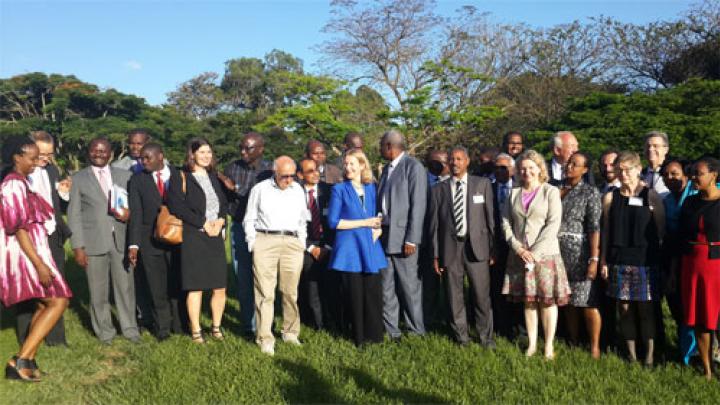MICT and ICTR Prosecutor Jallow hosts a High-Level Roundtable on Promoting Accountability

As part of activities marking the official Closing Ceremony of the International Criminal Tribunal for Rwanda in Arusha, Tanzania, the Prosecutor of the ICTR and the Mechanism, Justice Hassan B. Jallow, on 2 December 2015, hosted a High-Level Roundtable Discussion on the promotion of accountability for international crimes at the national level.
Participants at the Roundtable included representatives from the international tribunals, prosecutors from national jurisdictions, distinguished academics in the field of international criminal law, Justice Mohamed Chande Chief Justice of Tanzania, Judge Navanethem Pillay former President of the ICTR and former UN High Commissioner for Human Rights, former Presidents of the ICTR: Judge Eric Mose, Judge Khalida Rachida Khan, Judge Sir Denis Byron, and the current President of the ICTR Judge Vagn Joensen. Other participants included Mr Serge Brammertz, Prosecutor of the ICTY, Mr Adama Dieng, UN Secretary-General’s Special Adviser on the Prevention of Genocide, Mr John Hocking, Registrar of the Mechanism, and Mr Stephen Rapp former Ambassador, Office of Global Criminal Justice of the US State Department.
In his Welcoming Statement at the Roundtable, Prosecutor Jallow noted that “while complementarity is the way forward in the investigation and prosecution of international crimes, it is not ready-made. States need to be empowered and assisted to be able to discharge what is now their primary responsibility, and that the future of the global campaign for justice depends very much on an effective partnership and sharing of responsibilities between the international and national criminal justice systems”. Prosecutor Jallow further noted that “fair trial is the cornerstone of any judicial process and that fairness is the yardstick by which any judicial system will be assessed”.
In his Opening Remarks, the Under-Secretary General for Legal Affairs and United Nations Legal Counsel, Mr Miguel de Serpa Soares, underscored the need for States to “rise to the challenge of prosecuting international crimes at the national level and to ensure that their national criminal justice systems are fair, efficient and based on the rule of law”. For his part, Judge Theodor Meron, President of the Mechanism stated that it now falls in great part to national jurisdictions to carry forward the legacy of the ICTR, to fight impunity, and to carry forward the principle of complementarity.
Participants at the Roundtable discussed various topics relating to promoting accountability at the national level including strategies for developing political will, ensuring adequate capacity both in terms of human and physical infrastructure, building effective partnerships to support national efforts amongst national authorities themselves and between national authorities and international judicial systems, and ensuring adequate and effective defence for the accused.
On a related note, a book entitled “Promoting Accountability under International Law for Gross Human Rights Violations in Africa” (Brill June 2015) was launched in honour of Prosecutor Jallow during the main ICTR Closing Ceremony on 1 December 2015. The book is co-edited by Professor Charles Jalloh of Florida International University in the United States and Dr Alhaji Marong, a legal practitioner from The Gambia. The Forewords to the book were written by Alhaji Sir Dawda Kairaba Jawara, former President of the Republic of The Gambia, and Judge Navanethem Pillay, former President of the ICTR and former UN High Commissioner for Human Rights. During the book launch at the ICTR main Closing Ceremony, Prosecutor Jallow thanked them together with the co-editors and all the contributors of essays in the book.